Summary
‘While fully agreeing that there is a difference between the work of a statesman and that of a philosopher … we should not admit that this difference is of such a kind that the former can be correctly described as a man of action and the latter as a man of thought. And in the same way, we should not wish to deny the difference between a priest and a layman: but we should deny that the life of the one was religious and the life of the other secular. As every life includes, and indeed is, both thought and action, so every life is essentially religious; and the secular life, if that means a life negatively defined by the mere absence of religion, does not exist at all.’
R. G. Collingwood Religion and Philosophy 1916 p. 35.‘Ours is an age when people pride themselves on having abolished magic and pretend that they have no superstitions. But they have as many as ever. The difference is that they have lost the art, which must always be a magical art, of conquering them. So it is a special characteristic of Modern European civilization that metaphysics is habitually frowned upon and the existence of absolute presuppositions denied. This habit is neurotic. It is an attempt to overcome a superstitious dread by denying that there is any cause for it. If this neurosis ever achieves its ostensible object, the eradication of metaphysics from the European mind, the eradication of science and civilization will be accomplished at the same time.’
- Type
- Chapter
- Information
- Religion and Public Doctrine in Modern England , pp. 159 - 190Publisher: Cambridge University PressPrint publication year: 1980

